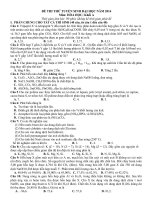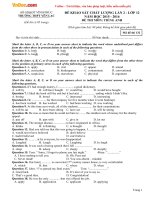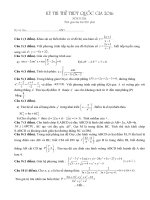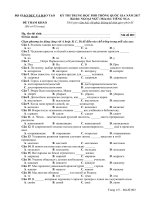- Trang chủ >>
- THPT Quốc Gia >>
- Ngoại Ngữ
ĐỀ THI THỬ TN THPT QUỐC GIA 2018 môn TIẾNG ANH (10)
Bạn đang xem bản rút gọn của tài liệu. Xem và tải ngay bản đầy đủ của tài liệu tại đây (76.04 KB, 5 trang )
LỚP ANH CÔ TRANG
(Đề thi gồm: 04 trang)
ĐỀ THI THỬ THPT QUỐC GIA NĂM 2017
Môn: TIẾNG ANH
Thời gian làm bài: 60 phút, không kể thời gian phát
đề
Ho va tên thi sinh:…………………………………………………………………….
Mark the letter A, B, C, or D on your answer sheet to indicate the word whose
underlined part differs from the other three in pronunciation in each of the following
questions.
Question 1: A. volunteered
B. disabled
C. determined
D. attended
Question 2: A. hospital
B. honest
C. holiday
D. hobby
Mark the letter A, B, C, or D on your answer sheet to indicate the word that differs from the
other three in the position of primary stress in each of the following questions.
Question 3: A. culture
B. protect
C. support
D. compare
Question 4: A. national
B. integrate
C. donation
D. charity
Mark the letter A, B, C, or D on your answer sheet to indicate the word(s) CLOSEST in meaning
to the ITALIC word(s) in each of the following questions.
Question 5: How many countries took part in the last Olympic Games?
A. succeeded in
B. hosted
C. performed
D. participated in
Question 6: The event, watched by millions of people all over the country, takes place annually.
A. once every year B. regularly
C. smoothly
D. sometimes
Mark the letter A, B, C, or D on your answer sheet to indicate the word(s) OPPOSITE in
meaning to the ITALIC word(s) in each of the following questions.
Question 7: Our main aim is to increase sales by 12% this year.
A. go up
B. decrease
C. rise
D. reach
Question 8: At about six in the evening the birthday party came to an end. We were all tired but
happy.
A. completed
B. finished
C. began
D. stopped
Mark the letter A, B, C, or D on your answer sheet to indicate the underlined part that
needs correction in each of the following questions.
Question 9: She asked why did Mathew look so embarrassed when he saw Carole.
A. asked why
B. did Mathew look C. embarrassed
D. saw
Question 10: We had better to review this chapter carefully because we will have some questions
on it on our test tomorrow.
A. to review
B. carefully
C. will
D. some
Question 11: I won't be able to go on holiday this year unless I will get a part-time job.
A. won't
B. to go
C. unless
D. will get
Mark the letter A, B, C, or D on your answer sheet to indicate the correct answer to each of the
following questions.
Question 12: We encourage students to participate fully________ the running of the college.
A. to
B. in
C. on
D. for
Question 13: Renowned MC Phan Anh himself________ VND500 million of his own money to
support flood-affected victims in the centre of Vietnam.
A. donated
B. received
C. lent
D. raised
Question 14: Anne hoped________ to join the private club. She could make important business
contact here.
A. to be invited
B. to invite
C. inviting
D. being invited
Question 15: If Mr. Smith________ this company, he would have made a lot of changes.
A. ran
B. is running
C. had run
D. runs
Question 16: Harry said he________ some good marks the semester before.
A. got
B. had gotten
C. have got
D. gets
Question 17: The government should________ family planning programmes to reduce
overpopulation.
A. carry on
B. account for
C. turn in
D. carry out
Question 18: I hate school. The teachers make us________ so much homework every day!
A. did
B. doing
C. to do
D. do
Question 19: The woman who received a $4 million jackpot prize has no plans on how to spend
the money yet, except for________ some of it to charity.
A. being given
B. to give
C. giving
D. gave
Question 20. She________ a big fuss about not having a window seat on the plane.
A. had
B. made
C. took
D. did
Question 21: They________ spent their summer vacations teaching illiterate people to read and
write. A. voluntary
B. voluntarily
C. volunteer
D. volunteered
Question 22: Instead of________ about the good news, Tom seemed to be indifferent.
A. being excited
B. exciting
C. to excite
D. to be excited
Question 23: By the end of next month, Sarah________ in government for 40 years.
A. will have been working B. will be working C. is working D. will work
Read the passage then choose the best answer to each question that follows. Identify your answer
by writing the corresponding letter A, B, C or D on your answer sheet.
Legend has it that sometime toward the end of the Civil War (1861-1865) a government
train carrying oxen traveling through the northern plains of eastern Wyoming was caught in a
snowstorm and had to be abandoned. The driver returned the next spring to see what had become
of his cargo. Instead of the skeletons he had expected to find, he saw his oxen, living, fat, and
healthy. How had they survived?
The answer lay in a resource that unknowing Americans lands trampled underfoot in their
haste to cross the “Great American Desert” to reach lands that sometimes proved barren. In the
eastern parts of the United States, the preferred grass for forage was a cultivated plant. It grew
well with enough rain, then when cut and stored it would cure and become nourishing hay for
winter feed. But in the dry grazing lands of the West that familiar bluejoint grass was often killed
by drought. To raise cattle out there seemed risky or even hopeless.
Who could imagine a fairy-tale grass that required no rain and somehow made it possible
for cattle to feed themselves all winter? But the surprising western wild grasses did just that. They
had wonderfully convenient features that made them superior to the cultivated eastern grasses.
Variously known as buffalo grass, grama grass, or mesquite grass, not only were they immune to
drought; but they were actually preserved by the lack of summer and autumn rains. They were not
juicy like the cultivated eastern grasses, but had short, hard stems. And they did not need to be
cured in a barn, but dried right where they grew on the ground. When they dried in this way, they
remained naturally sweet and nourishing through the winter. Cattle left outdoors to fend for
themselves thrived on this hay. And the cattle themselves helped plant the fresh grass year after
year for they trampled the natural seeds firmly into the soil to be watered by the melting snows of
winter and the occasional rains of spring. The dry summer air cured them much as storing in a
barn cured the cultivated grasses.
Question 24: What does the passage mainly discuss?
A. A type of wild vegetation
B. Western migration after Civil War
C. The raising of cattle
D. The climate of the Western United States
Question 25: What can be inferred by the phrase “Legend has it” in line 1?
A. Most history book include the story of the train.
B. The story of the train is similar to other ones from that time period.
C. The driver of the train invented the story.
D. The story of the train may not be completed factual.
Question 26: The word “they” in line 4 refers to___________.
A. plains
B. skeletons
C. oxen
D. Americans
Question 27: What can be inferred about the “Great American Desert” mentioned in line 7?
A. Many had settled there by the 1860’s.
B. It was not originally assumed to be a fertile area.
C. It was a popular place to raise cattle before the Civil War.
D. It was not discovered until the late 1800’s.
Question 28: The word “barren” in line 7 is closed in meaning to___________.
A. lonely
B. uncomfortable
C. infertile
D. dangerous
Question 29: The word “preferred” in line 8 is closed in meaning to___________.
A. favored
B. available
C. ordinary
D. required
Question 30: Which of the following can be inferred about the cultivated grass mentioned in the
second paragraph?
A. Cattle raised in the Western United States refused to eat it.
B. It had to be imported into the United States.
C. It would probably not grow in the western United States.
D. It was difficult for cattle to digest.
Question 31: Which of the following was NOT one of the names given to the western grasses?
A. Mesquite grass
B. Bluejoint grass
C. Buffalo grass
D. Grama grass
Question 32: Which of the following was NOT mentioned as a characteristic of western grasses?
A. They contain little moisture
B. They have tough stems
C. They can be grown indoors
D. They are not affected by dry weather
Question 33: According to the passage, the cattle help promote the growth of the wild grass
by___________.
A. eating only small quantities of grass
B. continually moving from one grazing area to another
C. naturally fertilizing the soil
D. stepping on and pressing the seeds into the ground
Read the following passage and mark the letter A, B, C, or D on your answer sheet to indicate
the correct word or phrase that best fits each of the numbered blanks from 4 to 8.
Caring for Children
A volunteer caring for children abroad can take on many roles but primary focuses usually
include education, communication and creativity. Many of these children have lost their homes
(34)_______ natural disasters or unstable political environments and are looking for someone to
help them create new homes to house themselves, friends or family. Volunteers are encouraged to
be (35)_______ in the lives of the children and their families. Some children may have lost their
parents and are (36)_______ role models to respect and look up too.
Volunteer with children abroad and you could not only ensure a better life for a rural,
underdeveloped community but also bring a great deal of self-satisfaction. You will make friends
for life (37)_______ the children and in many cases can choose (38)_______ in touch with those
you've helped.
Question 34:
Question 35:
Question 36:
Question 37:
Question 38:
A. thanks to
A. lived
A. making
A. to
A. to stay
B. because
B. taken part
B. calling
B. of
B. to be stayed
C. since
C. involved
C. asking
C. with
C. staying
D. due to
D. entered
D. looking for
D. for
D. to staying
Read the following passage and mark the letter A, B, C, or D on your answer sheet to indicate
the correct answer to each of the questions from 11 to 15.
The most usual way to entertain friends at home is to invite them for a meal, either in the
evening or at lunchtime on a Sunday. In smaller communities, for example a country village,
people also invite each other for a drink before a meal, for morning coffee or afternoon tea.
When guests are invited for a meal, they often sit and chat while they have a drink before
the meal, and coffee is usually served afterwards. Several friends are sometimes invited at once to
make a small party. These parties are almost always informal. Formal occasions, when written
invitations are sent out and people dress formally, rarely take place in people's homes, although
they did in the past.
Larger parties are arranged to celebrate a particular event. Children's birthdays are often
celebrated with a tea party for the child's friends. The meal will often be followed by party games.
Parties are held to celebrate a person's coming of age (formerly at 21 but now at 18), a couple's
silver wedding anniversary (after 25 years of marriage), a couple's engagement and New Year's
Eve. In the USA a person's 40th birthday is often marked with a special celebration. A
housewarming party is sometimes held to invite friends to one's new home.
In summer, if the weather is fine, people may hold a barbecue in the garden. A much
grander, more formal occasion is a garden party, held in the afternoon, when tea is served.
Question 39: The word "grander" in paragraph 4 mostly means ______.
A. more convenient B. more exciting
C. more pleasant
D. more important
Question 40: Which of the following is TRUE according to the passage?
A. People don't hold any parties to celebrate a particular event.
B. People often sit and chat before a meal they are invited for.
C. People don't invite each other for a drink before a meal in a country village.
D. People often hold garden parties on informal occasions.
Question 41: Nowadays, parties are held to celebrate a person's coming of age when they are______.
A. 25
B. 21
C. 40
D. 18
Question 42: Which of the following could be the best title of the passage?
A. Entertaining guests B. A garden party C. A birthday party D. A housewarming party
Question 43: When are written invitations sent out?
A. On formal occasions.
B. On a Sunday evening.
C. On informal occasions.
D. On a Sunday morning.
Mark the letter A, B, C, or D on your answer sheet to indicate the sentence that is
closest in meaning to each of the following questions.
Question 44: "Why didn't you answer my phone last night?" he said.
A. He asked me why he hadn't answered my phone last night.
B. He asked me why I hadn't answered his phone the night before.
C. He asked me why I hadn't answered his phone the night after.
D. He asked me why I didn't answer his phoned the night before.
Question 45: The picnic was cancelled because it rained.
A. If it hadn't rained, the picnic wouldn't have been cancelled.
B. If it hadn't rained, the picnic wouldn't be cancelled.
C. If it didn't rain, the picnic wouldn't have been cancelled.
D. If it didn't rain, the picnic wouldn't be cancelled.
Question 46: They finished their tea and then they left.
A. They finished their tea after they left. B. After they had left, they finished their tea.
C. After they had finished their tea, they left. D. They had left before they finished their tea.
Mark the letter A, B, C, or D on your answer sheet to indicate the most suitable
response to complete each of the following exchanges.
Question 47: Helen and Michael are waiting for the next bus at their school gate.
- Helen: "Excuse me. Can you tell me the time?" - Michael: "____________"
A. I've forgotten it. B. Here you are.
C. It's ten past nine. D. I've to go now.
Question 48: Lora is speaking to Tom at their friend's birthday party.
- Lora: "When's your birthday?"
- Tom: "____________"
th
A. I'm 24.
B. On June 10 .
C. Good idea!
D. Congratulations!
Mark the letter A, B, C, or D on your answer sheet to indicate the sentence that best combines
each pair of sentences in the following questions.
Question 49: I had never seen her before. However, I recognized her from a photograph.
A. I recognized her from a photograph before I had never seen her.
B. After I had seen her, I recognized her from a photograph.
C. Although I had never seen her before, but I recognized her from a photograph.
D. Although I had never seen her before, I recognized her from a photograph.
Question 50: He started to study at 2 o'clock. He is still studying now.
A. He was studying since 2 o'clock. B. He has been studying for 2 hours.
C. He has been studying since 2 o'clock. D. He usually studies for 2 hours.
___________THE END____________









